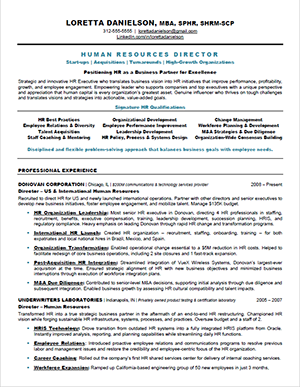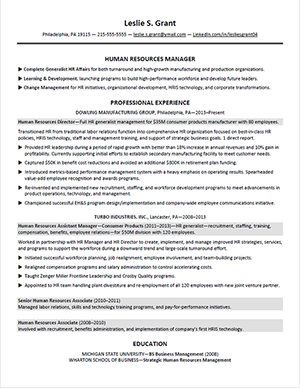No matter how many thousands of resumes you've reviewed throughout your HR career, you are likely to still find it difficult to write your own. Like anyone else, you need to step back and look at your career objectively. What will make people remember you? Why will others want to hire you? What can you bring to an employer that no one else can?
While there's no single formula or template to use in crafting an effective HR resume, we offer some guidelines that will help you showcase your greatest talents and accomplishments.
1. Use a Well-Branded Headline
Of course, your resume will start with your name and contact information (phone number and live links to both your e-mail address and LinkedIn profile) prominently positioned at the top of the page. Then create a headline statement that tells readers who you are professionally with regard to your current career objective. Readers should instantly see whether you're a generalist, specialist or senior executive. Your headline replaces the now outdated "Career Summary" or "Professional Profile" heading you may have used in the past.
Think about adding one or two subheadings to further define your expertise. Do you have an industry specialization? Any distinguishing credentials? Experience with a hot-button HR issue? With just a few words, you can convey what sets you apart from other candidates.
Be certain to highlight not only what you've done in the past but also what you want to do in the future. This is extremely important because you want readers to perceive you as qualified for the positions you're targeting.
If you have extensive experience managing compensation and benefits, for example, but you don't want that to be a major part of your next job, don't note it in your headline. Rather, simply mention it as appropriate in the experience section. Be selective and be strategic.
Tips continue below.
Resume Samples
2. Share Details About Where You've Worked
Help your readers understand the depth and breadth of your experience by providing details about the organizations where you've worked. You can cite the number of employees, locations, total annual revenue, specific business or industry, and other details. Knowing where you've worked before helps hiring managers put everything into context and makes your experience and accomplishments that much more impressive.
Just as with your headline, be strategic. If you've worked only at large public companies and now want to move to a small privately held business, the size of your prior organizations might scare off your target employers. Think about your goals and add the details that make you a good fit for the jobs you want.
3. Emphasize Achievements
This is perhaps the most critical strategy in creating a powerful and memorable resume. Without highlighting your achievements, your resume will sound much like that of any other HR professional who has similar experience.
While your knowledge and expertise are important, hiring managers want to know more. They seek to understand what you have done—how you have contributed to business objectives, how you have made a difference, what measurable results you have produced, what you have done to improve company culture and more.
Both quantified and unquantified results can add value, so don't feel you must have a hard number for every bullet point. But dig deep to find results wherever possible. Ask yourself about the problem you solved—not just the activity or task, but why it was important to the business.
4. Highlight HR Keywords
You know how important keywords are for both human readers and the electronic eyes scanning your resume, so make sure to scatter them throughout the document. You can create a "Core Competencies" or "Professional Skills Summary" section at the top, but that's not enough. Consider adding bold keywords at the start of each bullet point. This is a very effective strategy both for increasing the keyword density of your resume and for making your resume highly "skimmable."
5. Prepare Your Resume for ATSs
As an HR professional, you have the advantage of being able to "look under the hood" of an applicant tracking system (ATS) to see what happens in a typical keyword-driven resume review. Use that knowledge to your benefit.
Because there are so many ATSs, and because candidate searches are conducted by humans who have their own habits and preferences, you can't guarantee a perfect result from every ATS scan. But you can and should follow best practices for formatting your resume, integrating keywords and increasing keyword density.
For example, use and spell out acronyms so that the ATS has the best chance of picking up relevant terms, however they're defined. You might have "SHRM-SCP" at the top after your name, but that should become "Society for Human Resource Management Senior Certified Professional" under the "Education & Professional Credentials" section.
6. Share What Makes You Special
In addition to your professional experience and educational credentials, share your professional credentials (e.g., SHRM-SCP), professional affiliations (e.g., SHRM, OD Network), board of director appointments, and other leadership posts, presentations and public speaking engagements, media features and quotes, and publications.
We recommend that you focus on professional activities and exclude common civic or community-based affiliations. Resume "real estate"—just one or two pages—is extremely valuable, so you want to be certain that each line of text adds strength to your candidacy.
7. Write Tight, Lean and Clean
Clean, clear, concise writing is the hallmark of a good resume. Readers simply don't have the time or inclination to wade through irrelevant experiences, fluffy adjectives, unnecessary details and the other "filler" that weighs down many resumes.
No one writes this way on the first pass. It requires repeated review, careful editing, and a constant focus on strategy and goals to determine what's important to include and what does not support your professional brand and career objectives.
In addition to writing tight, pay attention to formatting. Avoid dense paragraphs (anything longer than three or four lines) and allow ample white space to create an inviting document that rewards readers, whether they come for a quick skim or a more thorough read.
Moving Forward
These guidelines cover just some of the things you can do to create a strong resume. Constantly remind yourself that you're writing to the future—to the positions that you're targeting—and emphasize relevant skills, experiences, achievements, keywords and results. If you do, chances are you will get noticed, interviewed and, we hope, hired.
Wendy Enelow and Louise Kursmark are both master resume writers, job and career transition coaches, and certified professional resume writers who have authored 40-plus books, including Modernize Your Resume: Get Noticed … Get Hired (Emerald Career Publishing, 2016).
An organization run by AI is not a futuristic concept. Such technology is already a part of many workplaces and will continue to shape the labor market and HR. Here's how employers and employees can successfully manage generative AI and other AI-powered systems.

 Resume Sample #1 (PDF)
Resume Sample #1 (PDF)




